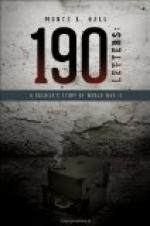and the throng, he no doubt produced the best of himself
in these letters; and it may be doubted whether, in
the course of a successful artist’s life, it
would have been given to him to express himself with
so much completeness. This is a thought that may
strengthen those who love him to accept whatever has
come to pass. His soul is here, a more essential
soul perhaps, and a more beautiful, than they had known.
It was in war that Marcus Aurelius also wrote his
thoughts. Possibly the worst is needful for the
manifestation of the whole of human greatness.
We marvel how the soul can so discover in itself the
means to oppose suffering and death. Thus have
many of our sons revealed themselves in the day of
trial, to the wonder of France, until then unaware
of all that she really was. That is how these
pages touch us so closely. He who wrote them
had attuned himself with his countrymen. Through
the more mystical acts of his mind we perceive the
sublime message sent to us from the front, more or
less explicitly, by others of our brothers and our
sons—the high music that goes up still from
the whole of France at war. In all his comrades
assembled for the great task, he too had recognised
the best and the deepest things that his own heart
held, and so he speaks of them constantly—especially
of the simplest of the men—with so great
respect and love. Far from ordinary ambitions
and cares, the things that this rough life among the
eternities brings into all hearts with a heretofore
unknown amplitude are serenity of conscience and a
freshness of feeling in perpetual touch with the harmonies
of nature. These men do but reflect nature.
Since they have renounced themselves and given themselves,
all things have become simple for them. They
have the transparence of soul and the lights of childhood.
‘We spend childish days. We are children.’
. . .
This new youthfulness of heart under the contemned
menace of death, this innocence in the daily fulfilment
of heroic duty, is assured by a spiritual state akin
to sanctity.
LETTERS
LETTERS OF A SOLDIER
August 6, 1914.
MY VERY DEAR MOTHER,—These are my first
days of life at war, full of change, but the fatigue
I actually feel is very different from what I foresaw.
I am in a state of great nervous tension because of
the want of sleep and exercise. I lead the life
of a government clerk. I belong to what is called
the depot, I am one of those doing sedentary work,
and destined eventually to fill up the gaps in the
fighting line.
What we miss is news; there are no longer any papers
to be had in this town.
August 13.
We are without news, and so it will be for several
days, the censorship being of the most rigorous kind.
Here life is calm. The weather is magnificent,
and all breathes quiet and confidence. We think
of those who are fighting in the heat, and this thought
makes our own situation seem even too good. The
spirit among the reservists is excellent.




